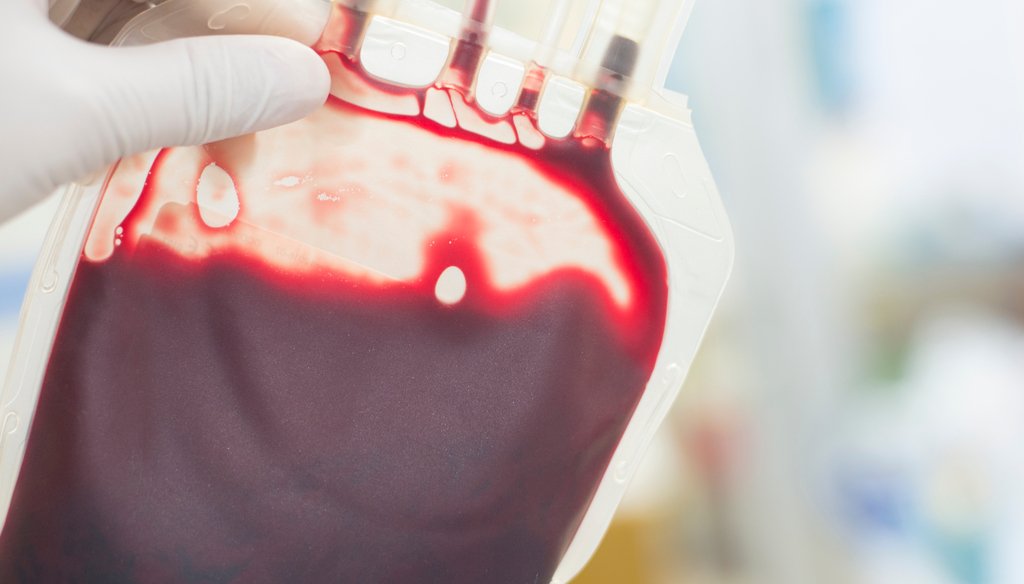Stand up for the facts!
Our only agenda is to publish the truth so you can be an informed participant in democracy.
We need your help.
I would like to contribute

Shutterstock
If Your Time is short
• A group of scientists reported research findings that people with Type A blood have a higher likelihood of catching COVID-19.
• The study was not peer reviewed or published in a scientific or medical journal.
• Experts caution against immediately accepting the study’s conclusions.
A research report showing a possible link between blood type and the likelihood of contracting coronavirus has been written up in various mainstream news publications, and it’s getting some play on social media, too.
One Facebook post shows an image of a woman wearing a medical mask alongside a graphic of a virus. "People with Type A blood are significantly more likely to catch coronavirus than those with Type O, Chinese academics have found," the image reads.
The post is based on the findings of a group of researchers at Chinese hospitals and universities who studied 2,173 patients from three hospitals in Wuhan and Shenzhen, China, who had tested positive for COVID-19.
But experts warn that the findings haven’t been validated. The study was made public on medRxiv, an online archive where researchers can post "complete but unpublished" medical research to generate debate among experts.
"Preprints are preliminary reports of work that have not been certified by peer review," the site is careful to emphasize. "They should not be relied on to guide clinical practice or health-related behavior and should not be reported in news media as established information."
The researchers said that the distribution of blood types for the general population in Wuhan, China, was:
- A: 32.16%
- B: 24.9%
- AB: 9.1%
- O: 33.84%
For those who tested positive for COVID-19 at Wuhan Jinyintan Hospital, they said, the blood type distribution was:
- A: 37.75%
- B: 26.42%
- AB: 10.03%
- O: 25.8%
Based on metaanalysis of this data, the researchers concluded that people with blood type A "have a significantly higher risk for acquiring COVID-19," while individuals with blood group O have "a significantly lower risk for the infection" when compared to other blood groups.
The study’s conclusions were reported by several news outlets including, the South China Morning Post, Newsweek, Science Focus, Science Alert and Medical News Today.
However, almost all of the outlets reported that the study was not published by a reputable medical journal or peer reviewed before it was posted online.
Doctors and medical researchers recommended caution before accepting the study’s conclusions as fact or letting the findings guide decision-making.
Gao Yingdai, a researcher from the State Key Laboratory of Hematology in Tianjin, China, told the South China Morning Post the study could have been improved with a larger sample size or a clear explanation for the correlation they described.
The study "may be helpful to medical professionals, but ordinary citizens should not take the statistics too seriously," Gao told the South China Morning Post.
She said people with type A blood should not panic and those with type O blood shouldn’t let their guard down.
Dr. Sakthivel Vaiyapuri, an associate professor at the University of Reading in the United Kingdom, advised ignoring the study.
"It’s better to safely ignore any article that hasn’t been properly scrutinized by peer review and published in a rigorous scientific journal," Vaiyapuri said to PolitiFact in an email.
Vaiyapuri said the study lacked "robust scientific validation" and expressed concern that it would cause individuals with type A blood to panic.
"Even if they get mild symptoms, instead of self-isolating themselves at home, they will start to queue up in the hospitals for higher level of treatment," he said. "This will cause serious issues for health care facilities and staff."
Vaiyapuri pointed out that the study had several limitations, including a sample size he described as too small.
"They also haven’t considered several other parameters which might have changed the conclusion completely," he said. "Moreover, they did not see any effect in one hospital that they analyzed. So this study is too speculative, and data are not robust to make any firm conclusions. People should not panic based on the outcomes of this study."
Our Sources
medRxiv, "Relationship between the ABO Blood Group and the COVID-19 Susceptibility," March 11, 2020
medRxiv, "About medRxiv," accessed March 23, 2020
Email interview with Dr. Sakthivel Vaiyapuri, an associate professor of cardiovascular and venom pharmacology at the University of Reading, March 23, 2020
South China Morning Post, "People with blood type A may be more vulnerable to coronavirus, China study finds," March 17, 2020
Newsweek, "Risk of getting COVID-19 could be linked to certain blood types, coronavirus study suggests," March 18, 2020
Science Focus, "Blood type A ‘more vulnerable’ to coronavirus," March 18, 2020
Science Alert, "Some Blood Types May Be Slightly More Susceptible to COVID-19, Paper Suggests," March 19, 2020
Medical News Today, "Is blood type linked to COVID-19 risk?," March 20, 2020
























